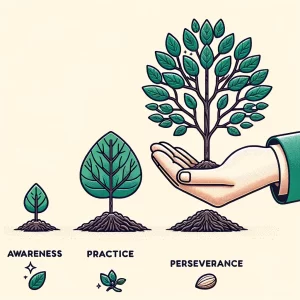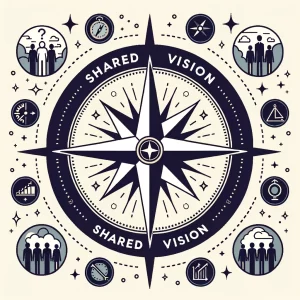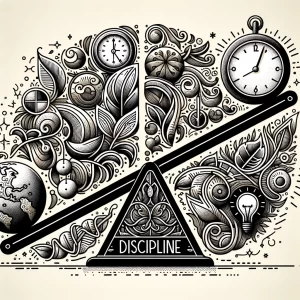Discipline in Leadership: Achieving Success Through Consistent Practice
Choosing Between Now and Most: The Importance of Discipline in Leadership
Discipline is often associated with punishment or strict rules and regulations, but in the context of leadership development, discipline refers to the practice of consistently making choices that align with long-term goals and values. It is the ability to delay gratification and resist short-term temptations in order to achieve greater rewards in the future.
The quote “Discipline is choosing between what you want now, and what you want most” is often attributed to Abraham Lincoln, although its true origin is unknown. Regardless of who said it, this quote captures the essence of discipline as a decision-making process that involves weighing the benefits of immediate desires against the potential consequences of neglecting long-term goals.
In the context of leadership development, discipline is a critical skill that enables individuals to become effective leaders who are capable of inspiring and guiding others towards a shared vision. Whether you are a CEO, manager, or team leader, discipline is a key ingredient for success.
Discipline is not a fixed trait that some people are born with and others are not. It is a skill that can be cultivated and developed through intentional practice and self-awareness. By understanding the benefits of discipline, as well as the challenges that come with maintaining it, leaders can take concrete steps to strengthen their discipline muscles and achieve their long-term goals.
In this article, we will explore the importance of discipline in leadership development, the benefits of cultivating discipline, how to develop discipline, the role of discipline in effective leadership, and the challenges that come with maintaining discipline. By the end of this article, readers will have a better understanding of what it takes to be a disciplined leader who can navigate complex challenges and achieve great success.
Benefits of Discipline
 Discipline is a powerful tool that can help leaders achieve their long-term goals, develop resilience, improve decision-making skills, enhance self-control, and boost productivity and efficiency.
Discipline is a powerful tool that can help leaders achieve their long-term goals, develop resilience, improve decision-making skills, enhance self-control, and boost productivity and efficiency.
Achieving Long-Term Goals
Discipline is critical for achieving long-term goals. It is easy to get distracted by short-term pleasures or to procrastinate when faced with difficult tasks. However, leaders who are disciplined are able to stay focused on their goals and take consistent action towards achieving them. By developing a clear vision of what they want to achieve, setting measurable goals, and breaking them down into smaller, manageable tasks, disciplined leaders are able to stay motivated and make progress even when faced with setbacks and challenges.
Developing Resilience
Resilience is the ability to bounce back from adversity and persevere in the face of challenges. Discipline is a key factor in developing resilience because it enables leaders to stay focused on their goals and take action even when faced with obstacles. Disciplined leaders are able to manage their emotions, stay calm under pressure, and maintain a positive outlook even when things don’t go according to plan. By developing resilience, leaders can lead their teams through difficult times and inspire them to keep pushing forward.
Improving Decision-Making Skills
Discipline also helps leaders improve their decision-making skills. When leaders are disciplined, they are able to approach decision-making in a more thoughtful and deliberate way. They are able to weigh the pros and cons of different options, gather all the necessary information, and make decisions based on long-term goals rather than short-term desires. This allows leaders to make more informed decisions that are more likely to lead to success.
Enhancing Self-Control
Self-control is the ability to resist immediate temptations and impulses in order to achieve greater rewards in the future. Discipline is critical for enhancing self-control because it helps leaders resist the temptation to give in to short-term desires and stay focused on their long-term goals. By practicing self-control, leaders can avoid making impulsive decisions, manage their emotions more effectively, and stay focused on their priorities.
Boosting Productivity and Efficiency Finally, discipline is essential for boosting productivity and efficiency. When leaders are disciplined, they are able to manage their time effectively, avoid distractions, and focus on the most important tasks. By setting clear priorities, creating a routine, and sticking to it, disciplined leaders are able to make the most of their time and energy. This allows them to achieve more in less time and be more effective leaders overall.
Discipline is a critical skill for leaders who want to achieve their long-term goals, develop resilience, improve decision-making skills, enhance self-control, and boost productivity and efficiency. By understanding the benefits of discipline, leaders can take concrete steps to cultivate this skill and become more effective leaders.
Cultivating Discipline
 While some people may seem to have a natural inclination towards discipline, it is a skill that can be developed and strengthened through intentional practice and self-awareness. In this section, we will explore some strategies for cultivating discipline in leadership development.
While some people may seem to have a natural inclination towards discipline, it is a skill that can be developed and strengthened through intentional practice and self-awareness. In this section, we will explore some strategies for cultivating discipline in leadership development.
Self-Awareness
Self-awareness is the foundation of discipline. Leaders who are self-aware are able to recognize their strengths and weaknesses, understand their values and priorities, and identify the triggers that lead them to make impulsive decisions. By becoming more aware of their own thought processes and behaviors, leaders can begin to make intentional choices that align with their long-term goals.
Setting Clear and Measurable Goals
Clear and measurable goals are essential for developing discipline. When leaders have a clear vision of what they want to achieve and specific goals to work towards, they are better able to stay focused and motivated. It is important to set goals that are challenging yet achievable, and to break them down into smaller, manageable tasks. By tracking progress towards these goals, leaders can stay accountable and maintain momentum.
Creating a Routine and Sticking to It
Creating a routine is another important strategy for cultivating discipline. When leaders have a consistent schedule, they are better able to manage their time, avoid distractions, and stay focused on their priorities. It is important to establish a routine that works for your individual needs and preferences, and to stick to it as much as possible. This may involve waking up early, dedicating specific time blocks to certain tasks, or taking regular breaks to recharge.
Avoiding Distractions and Temptations
Distractions and temptations can derail even the most disciplined leaders. It is important to identify potential distractions and temptations and take steps to avoid them. This may involve turning off notifications on your phone, blocking certain websites during work hours, or removing unhealthy snacks from your workspace. By removing potential distractions and temptations, leaders can stay focused on their goals and avoid making impulsive decisions.
Developing a Growth Mindset
Finally, developing a growth mindset is critical for cultivating discipline. Leaders who believe that they can grow and improve are better able to embrace challenges, learn from setbacks, and persist in the face of obstacles. By adopting a growth mindset, leaders can develop a sense of curiosity, resilience, and determination that helps them stay focused on their long-term goals.
Cultivating discipline requires self-awareness, setting clear and measurable goals, creating a routine and sticking to it, avoiding distractions and temptations, and developing a growth mindset. By practicing these strategies, leaders can strengthen their discipline muscles and become more effective in achieving their long-term goals.
The Role of Discipline in Effective Leadership
 Discipline is a critical skill for effective leadership. In this section, we will explore the role of discipline in leadership and how it enables leaders to inspire and guide their teams towards a shared vision.
Discipline is a critical skill for effective leadership. In this section, we will explore the role of discipline in leadership and how it enables leaders to inspire and guide their teams towards a shared vision.
Leading by Example
One of the most important ways that leaders can demonstrate discipline is by leading by example. When leaders practice what they preach and model disciplined behaviors, they inspire their teams to do the same. This may involve setting clear expectations, following through on commitments, and making intentional choices that align with long-term goals. By leading by example, leaders create a culture of discipline that permeates throughout the organization.
Creating a Culture of Discipline
Discipline is not just an individual trait, it is also a cultural norm. Leaders who prioritize discipline in their organizations create a culture of accountability, focus, and productivity. This may involve setting clear goals, establishing performance metrics, and holding team members accountable for their actions. By creating a culture of discipline, leaders enable their teams to work more effectively and achieve greater success.
Holding Team Members Accountable
Discipline also involves holding team members accountable for their actions. When leaders set clear expectations and establish performance metrics, they enable their teams to understand what is expected of them and how their performance will be evaluated. By holding team members accountable for their actions, leaders ensure that everyone is working towards a shared vision and contributing to the organization’s success.
Making Tough Decisions
Discipline is also critical for making tough decisions. Leaders who are disciplined are able to approach decision-making in a more thoughtful and deliberate way, considering the potential consequences of different options and weighing the long-term impact of their choices. By making tough decisions based on long-term goals rather than short-term desires, leaders demonstrate their commitment to the organization’s success and inspire their teams to do the same.
Balancing Short-Term and Long-Term Goals
Finally, discipline enables leaders to balance short-term and long-term goals. While it is important to stay focused on long-term goals, leaders must also be able to navigate short-term challenges and make decisions that balance immediate needs with long-term priorities. By developing discipline, leaders are better able to manage competing priorities and make decisions that enable the organization to thrive in both the short and long term.
Discipline plays a critical role in effective leadership by enabling leaders to lead by example, create a culture of discipline, hold team members accountable, make tough decisions, and balance short-term and long-term goals. By prioritizing discipline in their leadership development, leaders can become more effective in achieving their goals and inspiring their teams to do the same.
Challenges in Maintaining Discipline
 While discipline is a critical skill for effective leadership, it is not always easy to maintain. In this section, we will explore some of the challenges that leaders may face in maintaining discipline and strategies for overcoming them.
While discipline is a critical skill for effective leadership, it is not always easy to maintain. In this section, we will explore some of the challenges that leaders may face in maintaining discipline and strategies for overcoming them.
Overcoming Procrastination
Procrastination is one of the biggest challenges to maintaining discipline. It is easy to put off important tasks and focus on immediate pleasures or distractions. To overcome procrastination, leaders should identify the root causes of their procrastination, set clear goals and deadlines, break tasks down into smaller, manageable steps, and create a supportive environment that minimizes distractions and promotes focus.
Dealing with Setbacks and Failures
Setbacks and failures can also derail discipline. When leaders face challenges or setbacks, they may be tempted to give up or lose focus. To overcome setbacks and failures, leaders should focus on the lessons learned, identify the root causes of the problem, and make a plan for moving forward. By focusing on solutions rather than dwelling on the problem, leaders can maintain their discipline and stay focused on their goals.
Balancing Competing Priorities
Another challenge to maintaining discipline is balancing competing priorities. Leaders may have multiple responsibilities and tasks competing for their attention, which can make it difficult to stay focused on long-term goals. To overcome this challenge, leaders should prioritize their tasks, delegate responsibilities where possible, and avoid taking on too much at once. By focusing on the most important tasks and breaking them down into smaller, manageable steps, leaders can stay disciplined and make progress towards their goals.
Managing Stress and Burnout
Stress and burnout can also undermine discipline. When leaders are overwhelmed or exhausted, they may be more likely to make impulsive decisions or give in to distractions. To overcome stress and burnout, leaders should practice self-care, set realistic goals and expectations, and establish boundaries to protect their time and energy. By taking care of their physical and emotional well-being, leaders can maintain their discipline and lead their teams with clarity and focus.
Maintaining discipline can be challenging, but it is essential for effective leadership. By identifying the challenges to maintaining discipline and developing strategies for overcoming them, leaders can stay focused on their long-term goals and achieve great success.
Cultivating a Disciplined Mindset: Leading Towards a Better Future
Discipline is a critical skill for effective leadership. It enables leaders to achieve their long-term goals, develop resilience, improve decision-making skills, enhance self-control, and boost productivity and efficiency. By cultivating discipline, leaders can inspire and guide their teams towards a shared vision and create a culture of accountability, focus, and productivity.
However, maintaining discipline can be challenging. Leaders may face obstacles such as procrastination, setbacks and failures, balancing competing priorities, and managing stress and burnout. To overcome these challenges, leaders must be self-aware, set clear and measurable goals, create a routine and stick to it, avoid distractions and temptations, and develop a growth mindset.
As leaders continue to develop their discipline muscles, they can inspire their teams and drive organizational success. By leading by example, creating a culture of discipline, holding team members accountable, making tough decisions, and balancing short-term and long-term goals, disciplined leaders can achieve great success and inspire others to do the same.
In conclusion, discipline is not just a skill, it is a mindset. It requires intentional practice and self-awareness to develop and maintain, but the rewards are immense. As leaders prioritize discipline in their leadership development journey, they can achieve their goals and inspire their teams to do the same.






